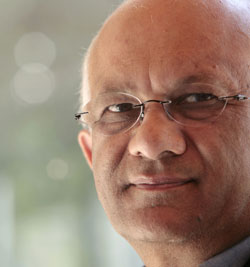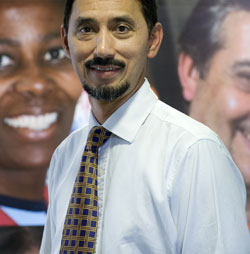Phillip de Wet went to the executive floor to find out what business thinks about the state of our economy and asked where we’ve got it right, where we’ve got it wrong and what might be in store for 2009

Connie Molusi
Executive director, Kabo Capital
Connie Molusi is not impressed.
The government’s response to the global financial crisis, he says, hugely underestimates the depth of the problem.
‘There is almost a denial,†says Molusi, who has been an adviser to the minister of communications and the chief executive of Johnnic Communications (now Avusa). ‘Government points to the soundness of the banking system but isn’t looking at facts like people losing their houses and retail shops starting to close.â€
He would like to see interventions that get local banks lending more money more often again. But he also has sympathy for the new administration coming in after April, saying it will have very little room to manoeuvre (for lack of money to work with) and will be constrained by South Africa’s dependence on the net inflow of foreign capital to help grow the economy.
‘There is a populism that underpins the election campaigns but any hasty populist positions will be punished by the markets and realism will come to the fore again. The rhetoric won’t survive.â€
Molusi doesn’t want to see government rescue packages for imperilled empowerment deals — and certainly not for anything associated with the media.
‘The market mechanism is a great antidote to the current cronyism that is bedevilling BEE, so in a sense if you rescue empowerment deals then you are deepening the cronyism.â€

Hasmukh Gajjar
Deputy chief executive, Faritec
Black economic empowerment has not fared well in service-based and knowledge-based sectors of the economy, says Hasmukh Gajjar.
Gajjar was previously the chairperson of Vodacom and has led the Black Information Technology Forum and the Black Business Council.
In labour-intensive industries there have been comparatively large gains, he says, but in the technology space not so much.
‘The sense I get is that the framework has been set up, both at a policy level and a legislative level, and that framework is probably about as fine-tuned as it can be, but the implementation has become a huge challenge,†he says.
Much of his beef is with the focus on black equity ownership, procurement from black-owned enterprises and corporate social investment spending, which are easy and fairly cheap ways to buy a good empowerment score.
Playing a part in skills transformation, in education and developing black talent is considerably harder and therefore sidelined.
Why? ‘Because we don’t have a significant oversight body outside the accreditation mechanisms to ensure that money is being spent well and that policy objectives come out in the implementation.â€

Gidon Novick
Joint chief executive, Comair
It’s just one thing after another, says Kulula.com’s Gidon Novick.
To make South Africa work, we have to be globally competitive. To do that, we need to decrease poverty. To decrease poverty, we must attract foreign investment. To do that, we need infrastructure on which government and private sector services can be efficiently delivered. Having the infrastructure without good service delivery — or having the wrong infrastructure — just won’t cut it.
‘The counter-cyclical spending on infrastructure is necessary and timely and all those good things but it doesn’t start and end with [capital expenditure] in massive projects,†he says. ‘We have Acsa [the parastatal Airports Company of South Africa] spending billions of rands on airports we don’t need, like La Mercy in Durban where we still haven’t seen one rational argument as to why it is being built. I think that kind of infrastructure spend should be questioned.â€
He is also concerned that new infrastructure, once built, will require good management to bring any benefit — and the track record of government-owned companies worries him in that regard.
‘In Transnet we have massive infrastructure and massive capital expenditure, but how is the service delivery? You look at some of the corporations using Transnet for logistics and they are trying to get away from using it; they aren’t happy with the service at all. The infrastructure doesn’t guarantee growth by itself.â€

Nazeem Martin
Managing director, Business Partners
Entrepreneurs are having a torrid time, says Nazeem Martin. The number of small Business Partners borrowers in distress is up between 20% and 30%, compared with this time last year.
‘Most SMEs [small and medium enterprises] are not high-flying, high-growth companies,†he says of the companies to which he provides venture capital funding in return for equity stakes.
‘We have a lot of ordinary franchises and corner shops that don’t have huge margins. If their turnover gets knocked by 20% then they have serious cash flow problems.â€
He cites restaurants (of which Business Partners has many as clients) as among the companies fastest hit as consumers trim discretionary spending. They often can’t retrench or trim the fat as their large corporate cousins can, so survival quickly hangs in the balance.
What can be done to help those in distress? ‘We distinguish between those who can’t pay and those who won’t pay,†he says. ‘Those who won’t pay we throw the book at. Those in distress we try to re-finance or restructure deals for. At the end of the day we are a business, so we find ways to share in the upside when the business does turn around, but we don’t foreclose by choice.â€